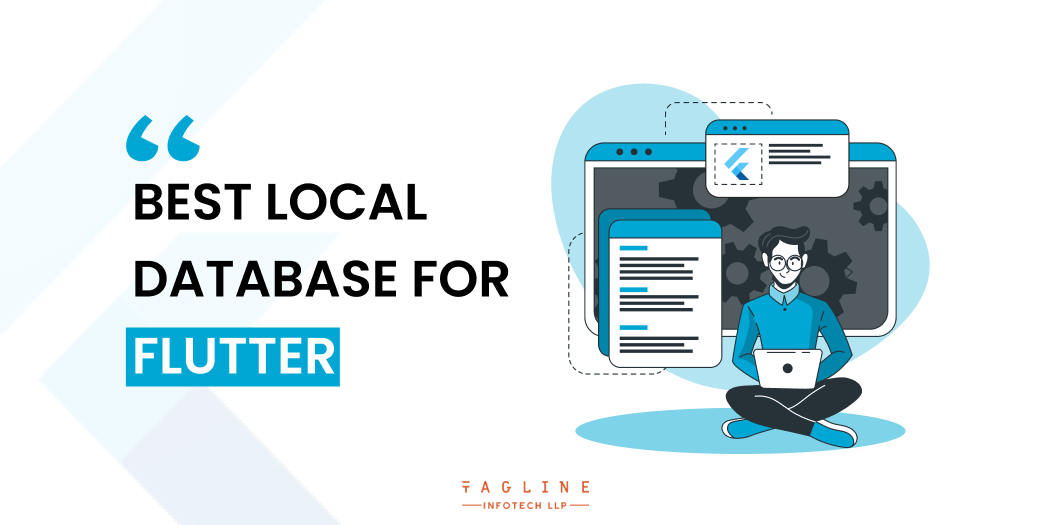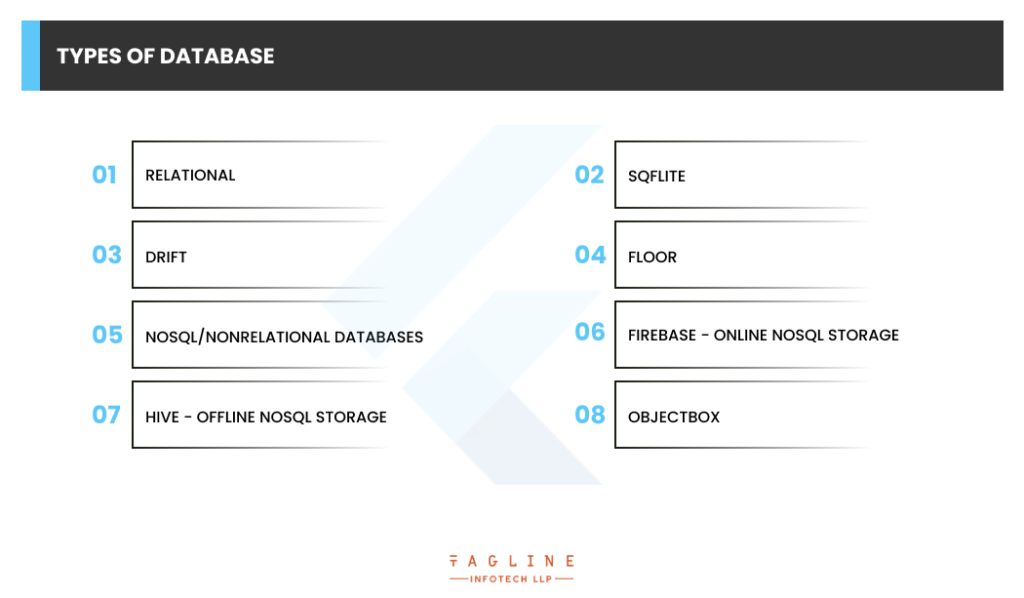What is Scalability in Cloud Computing? Types, Benefits,...
April 24, 2024
Home >> Flutter >> Best local database for Flutter

Any web application’s data is its most important component. The Flutter app needs a strong database to manage millions of records and regular data changes to operating effectively and seamlessly in real-time.
The best local database for the Flutter application will entirely depend on the needs of your project. Flutter local database is a UI toolkit developed by Google that offers several database management alternatives.
We can all agree that there are times when we think about storing and using data during the lifespan of developing a mobile app. A database is useful in situations like these.
A database is a collection of data stored on a computer. Professionals utilize databases to store information and maintain records like client data on their computers. Important data may be stored by computers in databases that can be searched.
Along with database technology, the numerous databases have changed throughout time. There are numerous distinct databases, and depending on how they were created, each has benefits and drawbacks. Organizations must be aware of the different databases to ensure the best configuration.

For the numerous operations they carry out, businesses need multiple databases. A corporation may utilise some or all of these, depending on the sector and operational needs:
The system known as relational databases was developed in the 1970s. Structured Query Language (SQL) is frequently used in this database for CRUD operations—creating, reading, updating, and deleting—of data.
Data is kept in this database in separate tables that may be linked together by fields called foreign keys. Consider connecting a user database, which has information about your users, to a purchases table, which contains information about the transactions those users have made. Examples include Oracle, Microsoft SQL Server, and MySQL.
Seeking dedicated teams for your next flutter projects?
Contact us at Tagline Infotech to build high performance database management flutter projects.
A robust SQLite implementation for Flutter called SQflite gives you total control over your database. You have total control over queries, relationships, and every other element of your database operations using SQflite.
Directly managing your application database with SQLite may be incredibly powerful but cumbersome. That explains why there are so many solutions that encapsulate some of SQLite’s functionality into functionality that is simpler to use. While keeping many of the advantages of SQLite, these abstractions can make a SQLite database simpler to use.
When you want relational data and precise control over the queries themselves, SQFlite is an excellent option. This could be a good fit for you if you’re at ease building your queries and don’t mind writing many queries and the code to convert the results to and from your classes.
Also Read : Top 10 Flutter Development Tools
A simple-to-use, reactive, and persistent library for Flutter apps is Drift, formerly known as Moor. You may create your database tables entirely in Dart while still taking advantage of the most cutting-edge SQLite capabilities.
Thanks to its robust SQL parser and analyser, you can build typesafe APIs for SQL queries. The queries are checked for accuracy at build time, alerting users to potential mistakes and producing effective code mapping.
This could be a good fit for you if you still want relational data but want to write as little SQL as possible (if you are accustomed to Entity Framework, for example).
The Room persistence framework served as the inspiration for Floor, a SQLite abstraction for Flutter applications. It offers an automated mapping between SQL-based databases and in-memory objects and database rows. One has to have a thorough grasp of SQL and SQLite to use Floor functionalities.
NoSQL is a catch-all word for any system that doesn’t use conventional SQL databases. NoSQL management systems sometimes refer to any database that doesn’t employ a relational paradigm. Unlike the rows and columns table structure used with RDBMS, NoSQL databases have a distinct data model.
NoSQL databases vary from one another. Document databases, key-value stores, column-oriented databases, and graph databases are the four different types of this database.
It’s a Backend-as-a-Service (BaaS) app development platform that offers cloud-hosted backend services like real-time databases, cloud storage, authentication, crash reporting, machine learning, and remote configuration for static database files spread across multiple devices rather than storing them on a single user device.
Data types with connections to other documents are stored in Firebase using the conventional document format. Users can therefore still establish associations between data even when the database isn’t fully relational.
This may be an excellent option if your data has to be distributed over several devices and you want (relatively) seamless syncing between them.
Are you looking to explore local database options for Flutter development?
consider seeking the expertise of a Flutter Development Company who can assist you in effectively integrating these databases into your application.
Hive is a pure Dart-based, lightning-fast key-value database. It is entirely Dart-native. It allows storing data as a HiveObject, enabling object relations. The NoSQL storage solution Hive is rapid for Flutter developers. Its primary selling point is that it is entirely Dart-native. Since Hive doesn’t require any device-specific implementations, it can go everywhere Dart does.
Hive is for you if all you need is a straightforward database to save data on your smartphone, if you don’t need the synchronisation that Firebase provides, and if you want something that works anywhere. It serves as the database for all of my applications.
Flutter uses the incredibly fast database ObjectBox to store items locally.
Like most other programmes, it has certain beneficial characteristics, such as scalability, statically typed code, cross-platform compatibility (i.e., ability to operate on Android, iOS, web, and desktop), and memory efficiency.
This is a great option if you have relational data and would like a simple method to display it on your PC while developing. For Flutter, Moor is a strong database library that offers a fluid interface for maintaining and querying your database. It is simple since it provides a fluent API for specifying database tables, queries, and relationships. Furthermore, moor has an integrated SQL database that lets you see and use your data on your PC. Although moor doesn’t support the web, it provides a practical flutter local database construction and administration option.
In light of the aforementioned, the best local database for flutter for your application will ultimately depend on the requirements of your specific project. Reliability, platform compatibility, usability, real-time synchronisation requirements, data type—relational or non-relational—and other factors should all be taken into consideration while making the decision.
SQflite, Drift, Floor, and Flutter are all good choices for relational databases. The database operations and relationships may be completely controlled using SQflite. By enabling Dart database table definitions and giving users a typesafe SQL query API, Drift makes it easier to utilise SQLite. Floor provides the automatic mapping between SQL databases and in-memory objects, a persistence framework inspired by the Room architecture.
A popular option for online storage with real-time synchronisation capabilities if you need a non-relational database is Firebase. Multi-device data distribution is appropriate for it. ObjectBox and Hive are effective choices for offline storage. In contrast to ObjectBox, which offers great speed and cross-platform compatibility, Hive is a small, natively written key-value database for Dart.
Considering your requirements, including your data structure, synchronization needs, usability, and platform support, you can also hire flutter developers to help you. Choose the solution that most closely fits the objectives of your project by carefully weighing each one in light of these criteria.
Flutter local database is a combination of different types of data in the form of rows, tables, columns, and indexes which are used to store different types of information.
Drift is considered one of the most uses local databases for Flutter because it is easy to use and reactive as well as a persistent library for Flutter applications.

Digital Valley, 423, Apple Square, beside Lajamni Chowk, Mota Varachha, Surat, Gujarat 394101
+91 9913 808 2851133 Sampley Ln Leander, Texas, 78641
52 Godalming Avenue, wallington, London - SM6 8NW